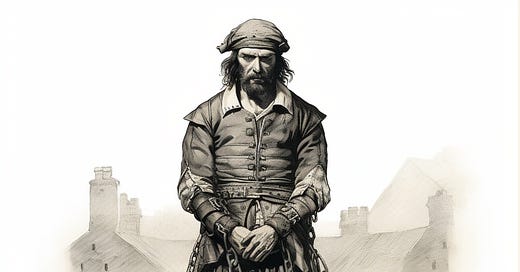Robert Baillie and the Rye-House Plot: A Scottish Patriot's Unyielding Stand for Freedom
In the pages of Scottish history, the name Robert Baillie of Jerviswood shines as a beacon of unwavering commitment to the cause of civil and religious liberty during the tumultuous late 17th century. Known as the "Scottish Sydney" for his principled stand, his life and his tragic entanglement in the Rye-House Plot reveal a man of unshakeable conviction and remarkable courage, even in the darkest of times.
The Early Life of Robert Baillie
Robert Baillie's journey began amidst the historic lands of St. John's Kirk, Lanarkshire, where he was born into a family of some prominence. The Baillie family held the esteemed estate of Jerviswood, and from a young age, Robert displayed a deep-rooted commitment to the principles of civil and religious freedom. This unwavering dedication would later shape the course of his life in profound and unexpected ways.
Read the new article from our daily premium feed : Sir William Baillie: The Battle of Langside and the Price of Protest
The Confrontation with Authority
The first rift between Robert Baillie and the government came in 1676, a year destined to mark his life indelibly. In that fateful year, his brother-in-law, the Reverend Mr. Kirkton, a non-conformist minister, fell victim to an unlawful arrest orchestrated by an informer named Carstairs, acting under the directives of Archbishop Sharp. Baillie's reputation as a fervent advocate of civil and religious liberties spurred him to take swift action, rushing to Kirkton's rescue. Little did he know that this courageous act would set in motion a series of events that would lead to his own persecution.
The Imprisonment and Enormous Fine
The price for Baillie's valorous intervention was steep. Summoned before the council, he faced the weight of an oppressive government. Under the influence of Archbishop Sharp, the authorities imposed a hefty fine on Baillie, reported variously as six thousand merks or £500 sterling (with sources offering differing accounts). Undeterred, Baillie endured four long months behind bars before securing his release, albeit at a considerable cost, paying half of the exorbitant fine to Carstairs. Throughout this ordeal, his unwavering stance against an unlawful arrest was resolute and evident to all.
Emigration Dreams and Correspondence with English Allies
By 1683, Baillie and a cohort of like-minded gentlemen found themselves disillusioned by the tyranny gripping Scotland. Their aspirations for a more just society led them to explore the possibility of emigrating to South Carolina, drawing inspiration from historical figures like Cromwell and Hampden. Concurrently, they initiated correspondence with prominent English Protestants, including luminaries like the Duke of Monmouth, Algernon Sydney, and Lord William Russell. Their letters sought advice on how to effectively challenge the oppressive policies of the Scottish government, hinting at the winds of change stirring in the political landscape.
The Rye-House Plot and Unintended Consequences
Fate took a cruel twist when Robert Baillie and his compatriots found themselves ensnared in the web of the Rye-House Plot. This audacious conspiracy aimed at the assassination of King Charles II and his brother, the future King James II, during their journey from Newmarket races to London. Despite their innocence in the conspiracy, Baillie and his associates were swept into the ensuing maelstrom of suspicion and fear.
Trial, Dwindling Health, and the Final Hours
The climax of Robert Baillie's harrowing ordeal arrived as he stood trial in Scotland. His health had deteriorated markedly by then, but he was determined to maintain his principled stance. Before the court, he solemnly denied any complicity in a conspiracy against the monarchy, yet the judges rendered their verdict regardless. On a bleak December 24th, 1684, the bells of Edinburgh tolled for Baillie's final journey as he was hanged at the city's market-cross. His severed head adorned the Netherbow Port, and his body was cruelly quartered, a gruesome fate for a man who had stood firm in his convictions.
Legacy
Robert Baillie's legacy endures as an emblem of unflinching commitment to the values of civil and religious liberty. Bishop Burnet's writings on Baillie's fortitude immortalized him in the annals of history, likening him to the noblest figures of antiquity, from early Christians to the heroes of Greece and Rome. His memory serves as an enduring testament to the indomitable power of conviction and courage when confronted by tyranny.
Conclusion
The life and tragic entanglement of Robert Baillie in the Rye-House Plot stand as a poignant reminder of the sacrifices made by those who held fast to their unwavering commitment to the principles of liberty and justice. Baillie's story continues to resonate across the ages, a testament to the enduring strength of conviction and valor in the face of adversity. His memory remains an everlasting inspiration to all who cherish the values of civil and religious freedom, shining as a beacon of hope through the corridors of time.





